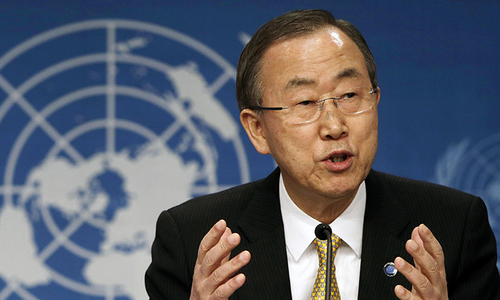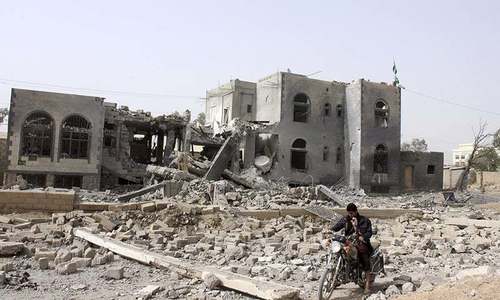UNITED NATIONS: United Nations Secretary-General Ban Ki-moon on Wednesday met Saudi Arabia's powerful deputy crown prince, who remarked that he was not angry with the UN chief for briefly blacklisting a Saudi-led coalition for killing children in Yemen.
Mohammed bin Salman is in New York this week, mainly for meetings with business leaders, after a visit to Washington and the US West Coast.
Earlier this month the Saudis threatened the United Nations with retaliation, including massive funding cuts for Palestinian aid and other programs, if it did not remove the Saudi-led Yemen coalition from a list of countries that maim and kill children during armed conflicts, UN officials said.
Ban then withdrew the Saudis from the list pending a review of cases the UN had analysed, though he publicly criticised the Saudi pressure on him.
On his way into the meeting, Salman was asked if he was still angry with Ban over the blacklisting.
"I'm not angry," he said.
Salman, who is also the kingdom's defence minister, did not answer questions when he left the meeting. It was not clear what was said, though one diplomatic source told Reuters without any detail that the meeting “went well.”
Salman kept Ban waiting for 45 minutes before arriving with his advisers and security detail. Also scheduled to attend the meeting was Leila Zerrougui, the UN special representative on children and armed conflict who originally decided to blacklist the Saudi-led coalition.
Zerrougui had vehemently opposed Ban's decision to remove the Saudis from the blacklist, despite Saudi threats that the United Nations could face a fatwa declaring it anti-Muslim, UN diplomatic sources said.
A fatwa is a legal opinion used in Shariah. In Saudi Arabia fatwas can only be issued by the group of top, government-appointed clerics and are sometimes commissioned by the ruling family to back up its political positions.
The Saudis have denied pressuring Ban, though they said the UN report was inaccurate.
The UN report on children and armed conflict said the coalition, which began an air campaign in March 2015 to defeat Iran-allied Houthi rebels, was responsible for killing 510 children and wounding 667, or 60 per cent of such deaths and injuries in the conflict last year.
The coalition's removal from the blacklist prompted angry reactions from human rights groups, which said that Ban, in the final year of his second term, risked harming his legacy as UN chief.














































